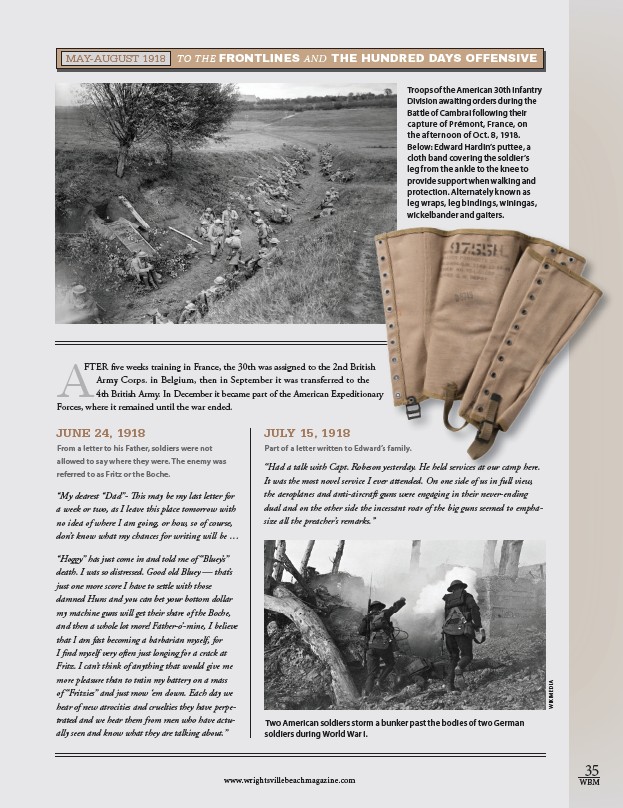
MAY-AUGUST 1918 TO THE FRONTLINES AND THE HUNDRED DAYS OFFENSIVE
AFTER five weeks training in France, the 30th was assigned to the 2nd British
Army Corps. in Belgium, then in September it was transferred to the
4th British Army. In December it became part of the American Expeditionary
Forces, where it remained until the war ended.
JUNE 24, 1918
From a letter to his Father, soldiers were not
allowed to say where they were. The enemy was
referred to as Fritz or the Boche.
“My dearest “Dad”- This may be my last letter for
a week or two, as I leave this place tomorrow with
no idea of where I am going, or how, so of course,
don’t know what my chances for writing will be …
“Hoggy” has just come in and told me of “Bluey’s”
death. I was so distressed. Good old Bluey — that’s
just one more score I have to settle with those
damned Huns and you can bet your bottom dollar
my machine guns will get their share of the Boche,
and then a whole lot more! Father-o’-mine, I believe
that I am fast becoming a barbarian myself, for
I find myself very often just longing for a crack at
Fritz. I can’t think of anything that would give me
more pleasure than to train my battery on a mass
of “Fritzies” and just mow ‘em down. Each day we
hear of new atrocities and cruelties they have perpe-trated
and we hear them from men who have actu-ally
seen and know what they are talking about.”
Troops of the American 30th Infantry
Division awaiting orders during the
Battle of Cambrai following their
capture of Prémont, France, on
the afternoon of Oct. 8, 1918.
Below: Edward Hardin’s puttee, a
cloth band covering the soldier’s
leg from the ankle to the knee to
provide support when walking and
protection. Alternately known as
leg wraps, leg bindings, winingas,
wickelbander and gaiters.
35
JULY 15, 1918
Part of a letter written to Edward’s family.
“Had a talk with Capt. Robeson yesterday. He held services at our camp here.
It was the most novel service I ever attended. On one side of us in full view,
the aeroplanes and anti-aircraft guns were engaging in their never-ending
dual and on the other side the incessant roar of the big guns seemed to empha-size
all the preacher’s remarks.”
WIKIMEDIA
Two American soldiers storm a bunker past the bodies of two German
soldiers during World War I.
www.wrightsvillebeachmagazine.com WBM